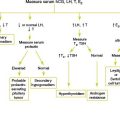Chapter 33 NOCTURNAL ENURESIS
Causes of Nocturnal Enuresis
Foods that increase nocturnal urine production
Key Historical Features
 Detailed toilet training history
Detailed toilet training history
 Number of dry nights per month
Number of dry nights per month
 Voiding behavior, especially small frequent voids that suggest bladder instability or small functional bladder capacity
Voiding behavior, especially small frequent voids that suggest bladder instability or small functional bladder capacity
 Bowel habits, especially constipation
Bowel habits, especially constipation
 Family’s and patient’s attitude toward the bedwetting
Family’s and patient’s attitude toward the bedwetting
 Polyuria/number of times per day that the child voids
Polyuria/number of times per day that the child voids
 Present and past treatments for nocturnal enuresis and their results
Present and past treatments for nocturnal enuresis and their results
Key Physical Findings
 Head and neck examination for evidence of mouth breathing
Head and neck examination for evidence of mouth breathing
 Abdominal and flank examination for the presence of masses, including an enlarged bladder or constipation
Abdominal and flank examination for the presence of masses, including an enlarged bladder or constipation
 Examination of the lower back for evidence of spinal dysraphism
Examination of the lower back for evidence of spinal dysraphism
 Urogenital examination for evidence of abuse or any physical abnormalities
Urogenital examination for evidence of abuse or any physical abnormalities
 Gait evaluation for evidence of neurologic deficits
Gait evaluation for evidence of neurologic deficits
 Extremity evaluation of muscle tone and strength
Extremity evaluation of muscle tone and strength
 Reflexes (including cremasteric, anal, abdominal, and deep tendon) to evaluate the functioning of the spinal cord in the pelvic region
Reflexes (including cremasteric, anal, abdominal, and deep tendon) to evaluate the functioning of the spinal cord in the pelvic region
 Rectal examination if the history suggests encopresis or constipation
Rectal examination if the history suggests encopresis or constipation
Suggested Work-Up
| Urinalysis | To assess specific gravity (for diabetes insipidus) and urinary glucose level (for diabetes mellitus) as well as to evaluate for the presence of infection or blood |
Additional Work-Up
| Urine culture | If symptoms suggest a UTI or if the urinalysis suggests infection |
| Voiding cystourethrogram and renal ultrasound | To evaluate for vesicoureteral reflux if the urine culture reveals an infection |
| Serum glucose | If the history or urinalysis suggests diabetes mellitus |
| Sleep study | If a sleep disorder is suspected |





















